THE LIVING TAO : TIMELESS WISDOM FOR THE MODERN WORLD
This is a podcast dedicated to exploring the profound, yet elusive True Tao (真道). Acknowledging that the essence of Tao is beyond traditional discourse and expression, this series seeks to demystify Taoist principles and adapt them for contemporary listeners. Each episode offers a blend of ancient wisdom and modern insights, providing practical guidance for navigating the complexities of today’s world. Whether you’re a seasoned practitioner or new to the path, join us in discovering how the timeless wisdom of Tao can be lived out in the here and now.
Episodes
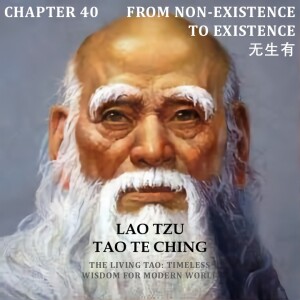
Wednesday Nov 20, 2024
Wednesday Nov 20, 2024
The Chapter is an excerpt from Chapter 40 of the Tao Te Ching, attributed to Lao Tzu. This chapter, titled "From Non-Existence to Existence," explores the cyclical nature of the Tao, emphasizing that all things originate from "Wuji," a state of nothingness, and ultimately return to it. The text describes how seemingly opposing forces, like strong winds and gentle breezes, demonstrate the transformative power of the Tao. It uses the concept of Taiji, representing the universe's potential, to further illustrate this continuous cycle of creation and return. Ultimately, the chapter highlights the fundamental principle of change and transformation inherent in the Tao.
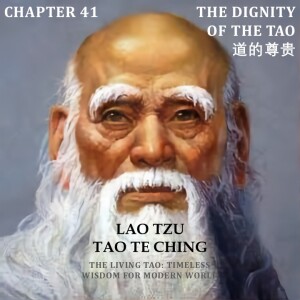
Wednesday Nov 20, 2024
Wednesday Nov 20, 2024
This Podcast presents Chapter 41 of the Tao Te Ching, exploring the nature of the Tao and its reception by different individuals. It categorizes people into three levels based on their understanding: superior, middling, and inferior, with the latter's laughter highlighting the Tao's enigmatic nature. The chapter further illustrates the Tao's subtle and profound characteristics through a series of paradoxes, such as "great sound is silent" and "great image has no form," emphasizing its unnamable and all-encompassing essence. Ultimately, the passage emphasizes the Tao's supportive yet unobtrusive role in creation and the importance of humility in achieving true understanding. The text offers both a classical Chinese version and a contemporary interpretation of the chapter.
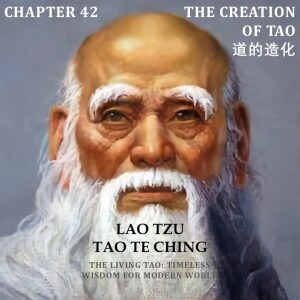
Wednesday Nov 20, 2024
Wednesday Nov 20, 2024
Lao Tzu's Tao Te Ching, Chapter 42, explores the creation of the Tao, beginning with the primal "One" that divides into Yin and Yang ("Two"), which then gives rise to a third element creating "Three," and ultimately, the myriad things of the universe. The chapter emphasizes the importance of emptiness and yielding, suggesting that apparent weakness is a source of strength. It contrasts this with the arrogance of rulers who, through boastfulness, invite their downfall. Ultimately, the text advocates for humility and following the natural order of the Tao.
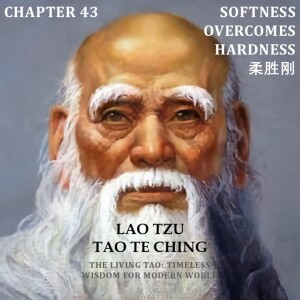
Wednesday Nov 20, 2024
Wednesday Nov 20, 2024
The Tao Te Ching's Chapter 43, titled "Softness Overcomes Hardness," uses the example of water to illustrate how seemingly weak forces, like gentle persuasion or natural processes, can overcome seemingly strong ones. The text emphasizes the power of yielding and inaction, arguing that subtle, unspoken influence is superior to forceful methods. This concept is further exemplified through the roles of a sage and a mother, highlighting the profound impact of quiet leadership and nurturing. The ultimate message centers on the effectiveness of indirect, natural forces in achieving lasting influence. The chapter concludes by asserting the superiority of this approach over more overt methods of teaching and control.
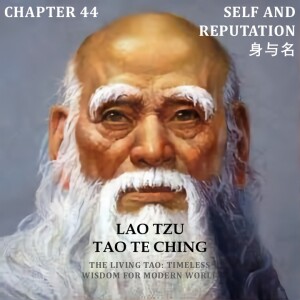
Wednesday Nov 20, 2024
Wednesday Nov 20, 2024
This Podcast presents Chapter 44 of the Tao Te Ching, focusing on the contrast between external reputation and material possessions versus one's inner self and contentment. The chapter argues that prioritizing external factors leads to exhaustion and loss, while finding fulfillment in one's true self promotes peace and longevity. It emphasizes the importance of knowing when to stop accumulating wealth and reputation to avoid the dangers of greed and envy. The author questions which is more valuable, reputation or one's self, and material possessions or inner peace, ultimately advocating for moderation and inner harmony.
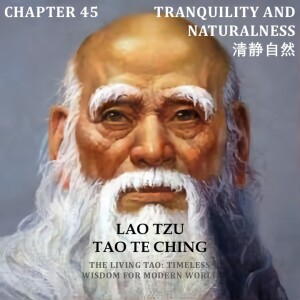
Wednesday Nov 20, 2024
Wednesday Nov 20, 2024
Lao Tzu's Chapter 45 of the Tao Te Ching, titled "Tranquility and Naturalness," explores the paradoxical nature of true mastery. It argues that genuine accomplishment manifests as humility, seemingly flawed yet ultimately potent and enduring. The chapter contrasts outward appearances with inner reality, showing how those who possess great skill or knowledge may appear simple or quiet. Ultimately, it advocates for tranquility and naturalness as the path to achieving harmony and justice in the world. The text uses contrasting imagery to illustrate the power of inner peace over external agitation.
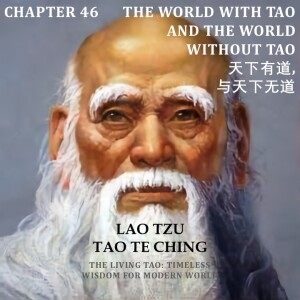
Wednesday Nov 20, 2024
Wednesday Nov 20, 2024
This Chapter is an excerpt from Chapter 46 of the Tao Te Ching, focusing on the contrast between a world governed by the Tao and one that is not. When the Tao prevails, there is peace, prosperity, and contentment; in its absence, chaos and war erupt. The chapter emphasizes that excessive desire is the root of suffering, both on a societal and individual level. Contentment, therefore, is presented as the key to both personal fulfillment and societal harmony. The text illustrates this through analogies comparing societal order to an individual's internal state.
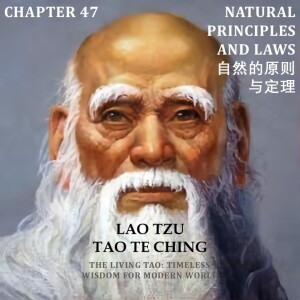
Wednesday Nov 20, 2024
Wednesday Nov 20, 2024
This Podcast presents Chapter 47 of the Tao Te Ching, focusing on the sage's understanding of natural principles. It contrasts the sage's inherent wisdom, gained through inner reflection and alignment with the Tao, with the limited knowledge of ordinary people who seek understanding through external observation and travel. The chapter emphasizes that true knowledge stems from understanding the underlying principles of Yin and Yang, rather than accumulating superficial information. The sage, therefore, possesses comprehensive knowledge without needing to actively seek it, highlighting the importance of inner peace and harmony with the natural order. This wisdom allows the sage to effortlessly act in accordance with the Tao, accomplishing great things without conscious effort.
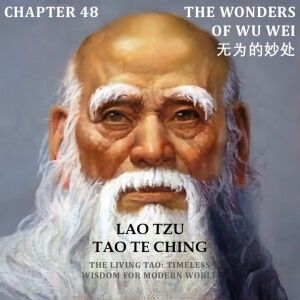
Wednesday Nov 20, 2024
Wednesday Nov 20, 2024
This Chapter excerpts Chapter 48 of the Tao Te Ching, focusing on the concept of Wu Wei (non-action). It contrasts accumulating knowledge with the Taoist principle of daily diminishing, arguing that true mastery comes from relinquishing personal desires and aligning with the natural order. The text uses examples of successful and unsuccessful rulers to illustrate how Wu Wei, achieved through morality and benevolence, leads to effective governance, unlike forceful control driven by selfish ambition. Ultimately, it emphasizes the paradoxical nature of Wu Wei, where effortless action arises from a state of stillness and harmony with the universe.
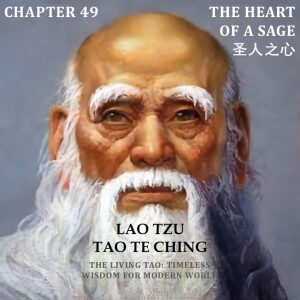
Wednesday Nov 20, 2024
Wednesday Nov 20, 2024
Lao Tzu's Tao Te Ching, Chapter 49, describes the sage's unwavering compassion. The sage possesses no personal bias, treating both good and bad people with equal kindness and trustworthiness to inspire positive change. This selfless devotion causes the sage to worry constantly for the people's well-being, sacrificing personal peace for their benefit. The sage's magnanimity earns the people's respect and inspires them to self-improvement, viewed as children in need of guidance. The chapter emphasizes the sage's selfless virtue and its transformative effect on society.

The Living Tao
Welcome to The Living Tao: Timeless Wisdom for the Modern World—your guide to living a life of balance, wisdom, and inner peace. Inspired by the profound teachings of ancient masters, this podcast explores the enduring relevance of these timeless insights in today’s fast-paced world.
Taoist teachings emphasize living in harmony with the natural flow of life—the Tao, or "the Way." This philosophy invites us to embrace simplicity, cultivate humility, and find peace by aligning ourselves with the rhythms of the universe. At its heart, Taoism encourages us to let go of resistance, shed the distractions of ego, and discover the profound serenity that comes from living authentically and in tune with our true nature.
The Tao Te Ching, attributed to Laozi, is one of the most influential texts in Taoism and serves as a cornerstone of our discussions. Its poetic verses guide us to reflect on themes like balance, self-awareness, and effortless action, or wu wei. These teachings are not bound by time or culture—they resonate just as powerfully today, offering insights that help us navigate the complexities of modern life with grace and equanimity.
Each episode of The Living Tao will uncover practical wisdom rooted in these ancient teachings, presenting it in ways that are both accessible and transformative. Whether it's understanding the art of stillness in a world of constant movement, finding clarity amid chaos, or exploring the paradoxes of strength through softness, you’ll discover tools and perspectives to enrich your life and deepen your connection to the world around you.
Whether you're a seasoned practitioner familiar with the Taoist path or a newcomer drawn to its gentle yet profound philosophy, this podcast offers something for everyone. Together, we'll explore how these age-old principles can help us embrace change, cultivate mindfulness, and find a sense of purpose and inner peace in the face of life's challenges.
Join us on this journey of self-discovery, as we bring the wisdom of the Tao into the present moment. Let the timeless truths of this ancient tradition inspire and empower you to live a more harmonious and enlightened life. Tune in, reflect, and allow the teachings of The Living Tao to guide you back to the essence of who you are.








